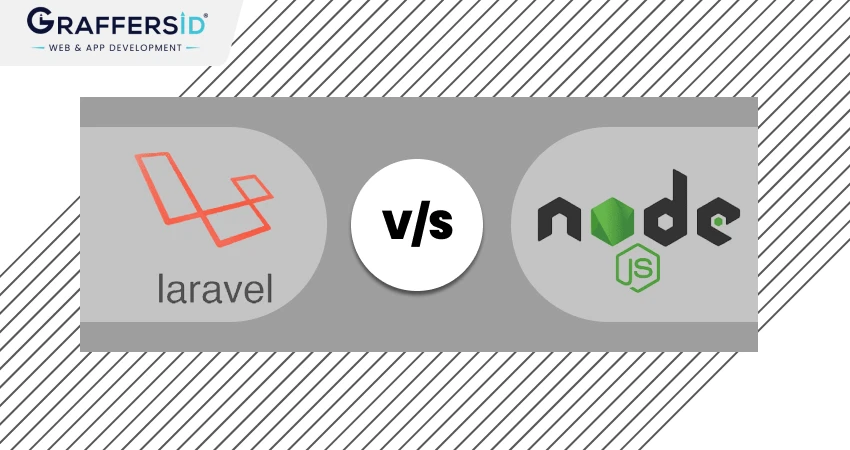Every web developer desires to use a backend technology that can boost the performance of their website and is highly scalable. Who doesn’t want it? When it comes to the best backend frameworks, people get confused between two of the best backend technologies Laravel vs Node JS which have their own unique set of features.
These web frameworks are designed to ease the web development process. They have in-built features and advanced functionalities that result in the smooth performance of web applications.
If you’re stuck and don’t know how to select the right backend technology, don’t worry, we have dismantled the Laravel vs Node JS comparison.
In this article, you will dive deep into Laravel and NodeJS and the comparison of Laravel vs Node JS based on their performance, scalability, testability, and many more.
What is Laravel?
It’s an open-source PHP web framework that uses existing components from different frameworks to develop web applications. Laravel is primarily known for its server-side handling of HTML authentication, routing, templating, and many more.
It’s a service-side application enabling you to develop web applications with customized backend logic, pre-defined architecture, templates, web portals, and full-stack apps.
Also, it offers an abundance of features that integrate the main components of the programming language Ruby on Rail and frameworks such as Yii and CodeIgniter.
According to Datanyze, Laravel holds more than 0.35% of the market share in web frameworks. This makes it an in-demand and popular PHP web framework that is preferably used by companies for developing web applications.
Furthermore, according to research conducted by Built With, more than 1 million websites have been built with Laravel, and the number of live websites is 7,833,345 and rising.
Here are some popular apps that have used Laravel as backend technology, such as Laracasts. It’s an e-learning website that provides various courses and is a great platform where you can raise technical queries and they will be addressed by technical experts.
If you want to build software using Laravel, Consult GraffersID to hire vetted in-house Laravel developers on a contract basis.
Barchart is a financial portal that has gained the advantage of showing updated market data on current exchanges, stocks, gold prices, trade offers, and many more.
Asgard CMS is a modular, multilingual central management system that offers modules to use, such as media management, dashboard, and flexible backend support.
Features of Laravel
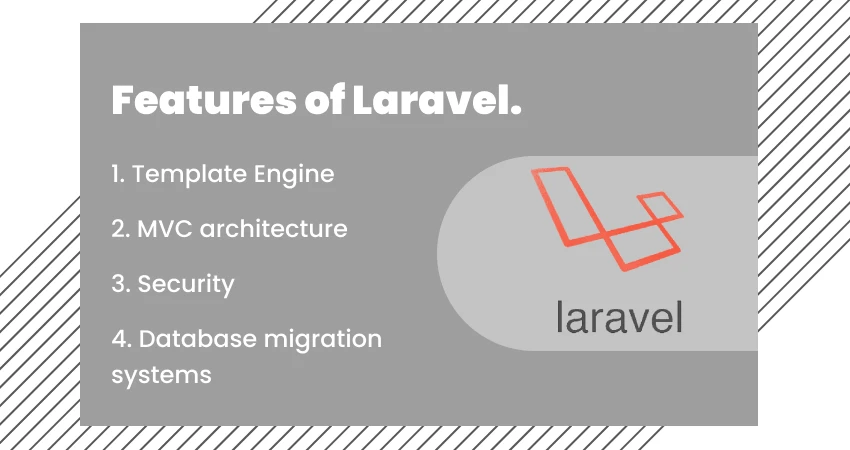
1. Template Engine
It provides awesome templates that provide amazing layouts. These templates are designed to create beautiful, simple, and complex layouts.
It provides a stable structure comprising multiple widgets that are integrated with JS and CSS code.
2. MVC architecture
Laravel supports the MVC architecture enabling a faster development process.
Here one programmer works on the view while another will work on the controller to create business logic in the web application.
The MVC architecture pattern has a host of built-in features to provide protection and improve the performance of web applications.
Furthermore, it avoids code duplication by separating the business logic from the presentation logic.
3. Security
Every developer would want their application to be secured. While developing an application, the programmer has to take effective measures to ensure the safety and security of the application. Laravel has in-built web application security which implies that it can effectively take care of its security by using the Bcrypt Hashing Algorithm.
In Bcrypt Hashing Algorithm, it uses salted and hashed password schemes to ensure strong safety and security.
Its password can’t be stored in plain text as it already gets saved as an encrypted password in the database.
It uses structured SQL statements to prevent attacks from SQL injections.
4. Database migration systems
Its database migration system expands the database structure of web applications so that they don’t have to be recreated every time a code change happens.
It mitigates the possibility of data loss. You can easily alter the structure of the database, and it also enables you to use PHP code rather than SQL code.
Furthermore, the Laravel schema builder allows you to build tables for the database and can attach columns and indices.
Advantages of Using Laravel
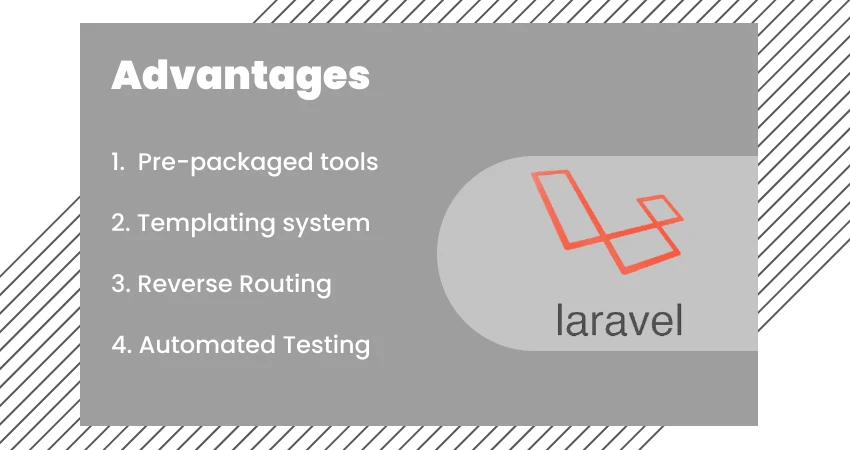
1. Pre-packaged tools
It provides ready-to-use packages for testing APIs and user authentication. It aids common tasks for building web applications.
2. Templating system
With its template engine, Blade, it provides the power to build complex web app layouts and format data. It’s easy to navigate and enables the addition of new features and modules without making any changes to the core.
3. Reverse Routing
Reverse routing is a different feature that provides automatic propagation of changes in routes and that results in relevant links. It creates URIs (uniform resource identifiers) automatically.
4. Automated Testing
It provides expressive testing behavior that facilitates making requests to the application functions. This makes testing less time-consuming.
Disadvantages of Using Laravel
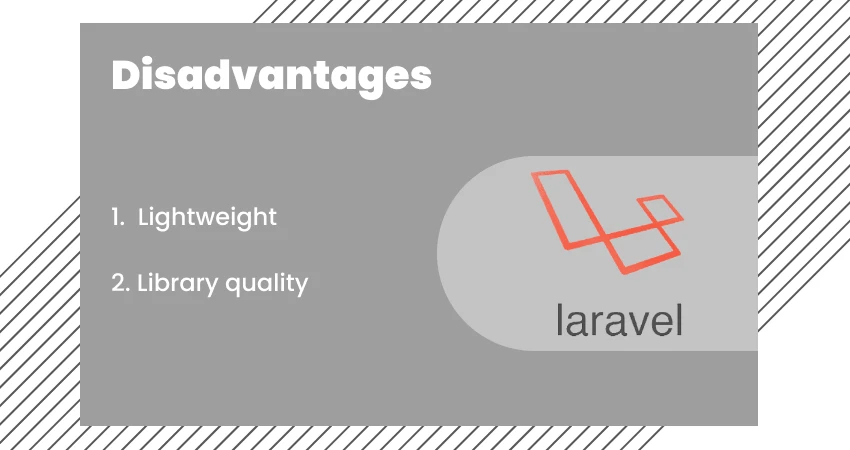
1. Lightweight
Generally, the lightweight feature is considered an advantage to the framework. However, Laravel, causes massive backend congestion of database queries, resulting in lower performance. As the level of congestion rises, the performance gets deteriorates.
2. Library quality
Although it’s an open source with great community support, it leads to unreliable third party libraries. Also, it becomes difficult to figure out which library is quality-supported and reliable.
What is NodeJS?
It’s an open-source, server-side, JavaScript-based runtime platform to build web applications. It includes JavaScript programs that run on Microsoft, Windows, and Linux platforms.
It’s a highly scalable and performance framework used for async programming and web loads.
Furthermore, it has an amazing library of JavaScript modules that work great for web applications.
To improve the backend capability, you can also use Node. js-based frameworks such as Meteor.js, Express, and Socket.io.
Node.js works well for building single-page websites, backend API services, and applications.
It can do more than just create interactive websites, it can perform tasks that most other scripting computer languages can’t, such as Python.
According to Stack Overflow Report 2020, more than 67% of developers have loved the experience with NodeJS
In addition, the NodeJS survey report states that more than 85% of developers use NodeJS for developing web applications.
Most popular and successful tech companies have used NodeJS such as Nads, Twitter, Trello, and Netflix.
If you are also planning to develop software using NodeJS, Consult GraffersID an award-winning staff augmentation company to hire Remote NodeJS Developers on contract basis.
Features of NodeJS
1. Asynchronous and event-driven
All libraries in Node.js are asynchronous or non-blocking. It never waits for APIs to return data.
The Node.js event notification function allows the server to get a response from the last API call, enabling the server to switch to the next API swiftly on call.
2. Single-threaded and scalable
Node.JS uses a single-threaded looping event mechanism. Unlike conventional servers that generate restricted threads to answer requests, the event mechanism enables the servers to react in a non-blocking way, making it highly scalable.
It’s a single-threaded program that can manage a substantially higher number of requests in comparison to conventional servers such as the Apache HTTP server.
Know which is better for your Development Project: PHP vs NodeJS?
3. Object-oriented
Earlier NodeJS had procedural spaghetti code in abundance. As a result, frameworks such as TypeScript and CoffeeScript were created to fix the issue.
With the acceptance of ES6 and extensions, Classes can be integrated into the system. The code seems to be syntactically identical to Java, Swift, and C++.
Advantages of Using NodeJS
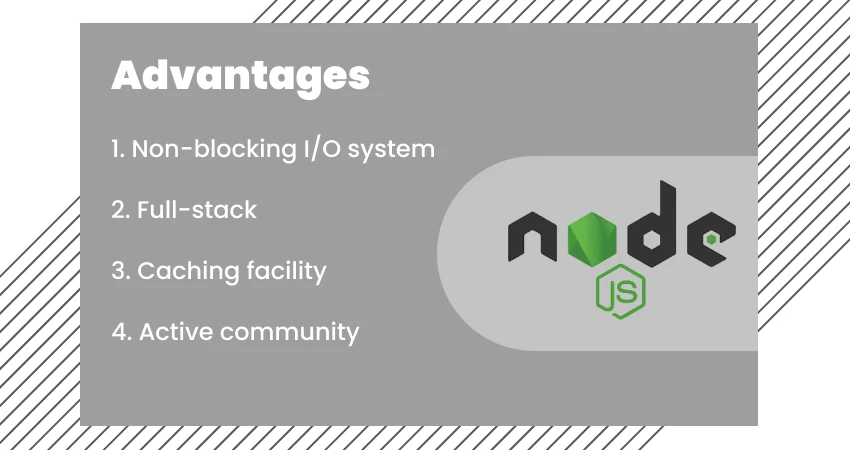
1. Non-blocking I/O system
The best part about Nodejs is the non-blocking feature that lets it process several requests at once, making it more scalable and faster.
2. Full-stack
It offers full-stack development, enabling the developers to both write front-end and back-end in JavaScript and enhance the performance, and ensure smooth deployment of the apps.
3. Caching facility
The caching feature minimizes the need to re-execute the code to improve the response time.
4. Active community
It enables developers to quickly access readily available solutions.
Disadvantages of Using NodeJS
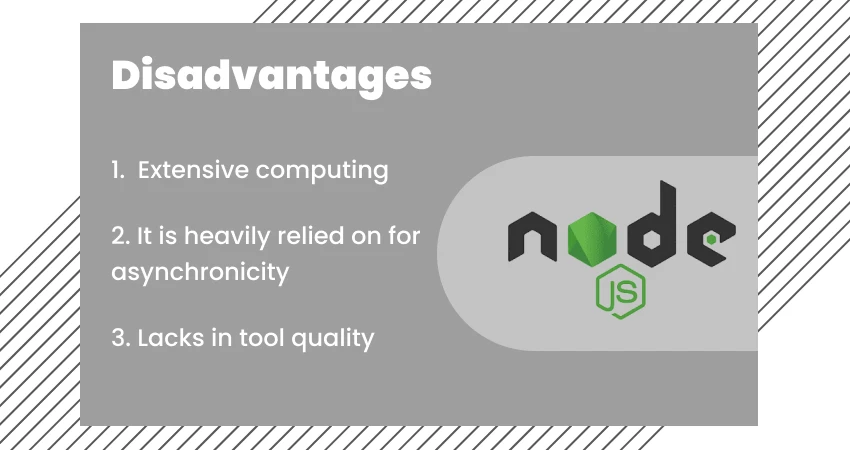
1. Extensive computing
Nodejs does support complex apps but is not suitable for extensive computing. Furthermore, it’s inefficient in heavy calculations as it doesn’t support multiple threaded programs.
2. It is heavily relied on for a synchronicity
It has the best callbacks, but it is heavily reliant on synchronicity, making the code difficult to comprehend.
3. Lacks in tool quality
Some tools in Node js don’t go into resonance due to high coding standards.
Know in detail the advantages and disadvantages of using NodeJS
Laravel vs Node JS: A Detailed Comparison 2023
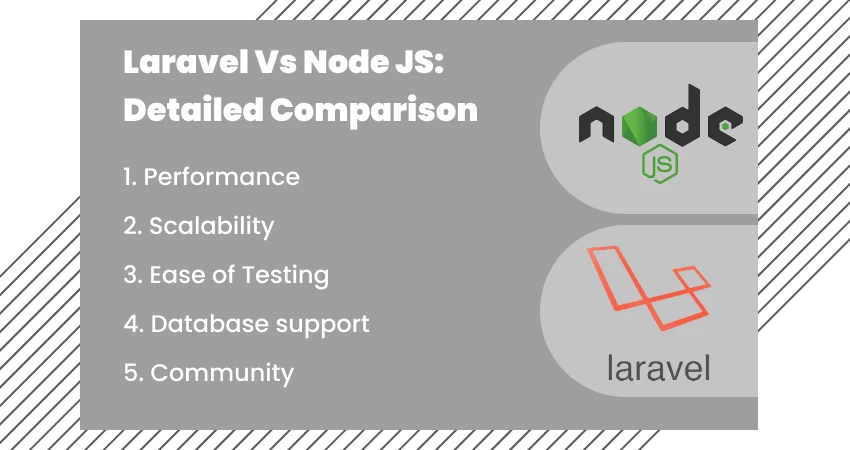
You must be wondering which one is the best and which should you choose for web app development. Here are some parameters on which we have compared Laravel and NodeJS and there is a detailed comparison of Laravel vs Node JS.
1. Performance
Performance is a crucial factor to consider when developing web applications.
The performance of Laravel is considered slow, but the performance can be improved if optimized effectively.
The cache tags in Laravel enable applications to load pre-stored information that leads to faster response time and eventually better performance.
While Node.js offers an asynchronous or non-blocking future, it’s ideal for microoperations or little actions that don’t interfere with the main thread.
Also, it processes multiple requests simultaneously, making it more efficient and a higher-performing language than other backend languages.
Furthermore, most tech companies are gravitating towards node js for its highly efficient performance.
LinkedIn saw a reduction in its server turn 20 times faster when it shifted to Nodejs.
2. Scalability
It’s extremely important to choose the right framework when developing web applications. Choose a framework with high scalability.
The apps that are built on Laravel are scaling up their applications. Laravel gets its scalability from PHP. In addition, Laravel can achieve huge horizontal scaling by using the right load balancer and database.
By using AWL and MySQL, and by using advanced caching methods, it can scale according to the requirements.
Node.js applications are often scalable due to their event-driven models and non-blocking I/O, which can accommodate numerous requests.
Its event loop mechanism enables the server to handle an array of requests. Moreover, its compatibility with microservices works well together by segregating applications into smaller components.
Through segregation, it becomes easy to allocate tasks and develop applications more efficiently.
3. Ease of Testing
Web app development isn’t just confined to developing an app; it’s more than that. The app has to go through a series of tests to ensure it meets the desired UI standards, usability, and compatibility.
Laravel offers tools and resources in abundance for testing. These tools are made available in abundance to ensure that they deliver bug-free applications. To ease up testing, it does test coding at two levels: unit and feature.
Furthermore, it has robust testing documentation and offers various tools to test the application at all levels, and it also provides mock tests.
While Nodejs provides debugging capabilities and competent testing, It does offer various automated testing tools such as Jasmine, lab and code, AVA, mocha, and jest, and it builds a sound testing environment for applications.
You can make the most of these testing libraries, such as Chai, Mocha, and Jest, to provide a bug-free and seamless experience.
4. Database support
At present, Laravel supports four databases: SQLite, SQL, PostgreSQL, and MySQL. Also, the raw SQL and Eloquent ORM make the interaction with these databases much easier.
You can also establish various database connections to configure with Laravel.
Generally, not all databases support Laravel, but if you get comfortable with a database that supports Laravel, you will face no issues with it.
Conversely, Nodejs supports almost all types of databases, such as NoSQL and relational.
It’s recommended to use NoSQL databases such as MongoDB to store data in JSON objects, as it provides more accessibility for NodeJS.
Know more about Golang vs NodeJS
5. Community
When it comes to server-side programming for online applications, PHP holds 79 percent of the industry.
With over 46,231 active users, 18,105 threads, 63.5k GitHub stars, and 4.7k real-time viewers, Laravel has a large community.
The community’s maximum time to resolve a Laravel query is three days. Furthermore, both PHP has a strong community where Developers share Laravel podcasts, news, docs, repositories, and many more.
You can come across the Laravel community on Laracast, Laravel.io, Reddit, dev, Stack Overflow, and GitHub.
Conversely, Node.js has a thriving and well-supported community. According to Stack Overflow, Node.js is used by 51.4 percent of professional developers for frameworks, libraries, and tools. Amazon, Facebook, and Google have all made substantial contributions to the Node.js ecosystem, bolstering the technology’s credibility.
There are various community forums for Nodejs such as Nodebb, Reddit, Stack Overflow, GitHub, Dev. to.
These were the parameters to consider when assessing between Laravel and Node JS.
Determining which technology is more popular among developers, Laravel or Node.js, can vary depending on various factors such as the specific community being considered, the project requirements, and regional trends. However, historically, Node.js has had a broader adoption due to its versatility and efficiency in building scalable, real-time applications, particularly in server-side development.
Node.js is highly favored for its event-driven, non-blocking I/O model, which makes it suitable for building fast, lightweight, and efficient applications. It’s particularly popular in web development, APIs, microservices, and real-time applications such as chat applications, gaming servers, and IoT systems.
On the other hand, Laravel, a PHP framework, is also popular among developers, especially for building web applications and APIs. Laravel provides a robust set of tools and features for rapid application development, including built-in support for authentication, routing, caching, and more. It’s known for its elegant syntax, developer-friendly approach, and rich ecosystem of packages.
In recent years, both Laravel and Node.js have gained significant traction, and their popularity often depends on the specific requirements of a project, the expertise of the development team, and the preferences of the developers involved. While Node.js excels in certain areas like real-time applications, Laravel offers a streamlined development experience for PHP developers.
Performance Benchmarks: Laravel vs. Node.js in 2025
With 2025 upon us, developers are eager to know which of these frameworks holds the edge in terms of performance. In this blog post, we’ll delve deep into the performance benchmarks of Laravel and Node.js.
Laravel Performance Benchmarks:
- Speed: Laravel has seen significant performance enhancements over the years, thanks to optimizations in PHP itself and improvements in the framework’s codebase. In 2025, Laravel boasts impressive speed, especially when paired with PHP 8 and OPcache.
- Scalability: Laravel’s scalability has improved with enhancements in database query optimization and caching mechanisms. With features like Laravel Horizon for managing queues and scaling applications horizontally, Laravel can handle large-scale projects efficiently.
- Resource Consumption: While Laravel offers rich features and developer convenience, it may consume more resources compared to leaner frameworks. However, optimizations in PHP and Laravel’s caching mechanisms help mitigate resource overhead.
Node.js Performance Benchmarks:
- Speed: Node.js continues to excel in terms of speed, leveraging asynchronous programming to handle concurrent requests efficiently. With improvements in the V8 engine and Node.js core optimizations, the framework delivers blazing-fast performance in 2025.
- Scalability: Node.js shines in scalability, thanks to its non-blocking I/O model, which enables handling thousands of concurrent connections with ease. With features like clustering and load balancing, Node.js applications can scale horizontally to meet increasing demands.
- Resource Consumption: Node.js is renowned for its low resource consumption, making it ideal for building lightweight microservices and real-time applications. Its event-driven architecture minimizes overhead, resulting in efficient resource utilization even under heavy loads.
Benchmarking in Real-World Scenarios: Laravel Vs Node.js
While performance benchmarks provide valuable insights, real-world scenarios often present unique challenges. Factors such as application architecture, database design, third-party integrations, and developer expertise play crucial roles in determining overall performance.
- Web Applications: For traditional web applications with complex business logic and relational database requirements, Laravel’s expressive syntax and rich ecosystem of packages make it an excellent choice. Its ORM capabilities and built-in features like authentication and authorization simplify development.
- Real-time Applications: When it comes to real-time applications like chat applications or gaming platforms requiring low-latency communication, Node.js shines. Its event-driven nature and support for WebSockets enable developers to build responsive and interactive experiences.
- Microservices: For microservices architectures where scalability and resource efficiency are paramount, Node.js’s lightweight footprint and non-blocking I/O model offer significant advantages. With the rise of containerization and serverless computing, Node.js has become a preferred choice for building microservices deployed in cloud environments.
Conclusion
Both technologies are efficient and work best in their ways. We have compared both the backend technologies, emphasizing the main parameters to help you look beyond the comparison of Laravel vs Node JS in 2023.
Choose a backend technology that is in resonance with your business goals and requirements.
